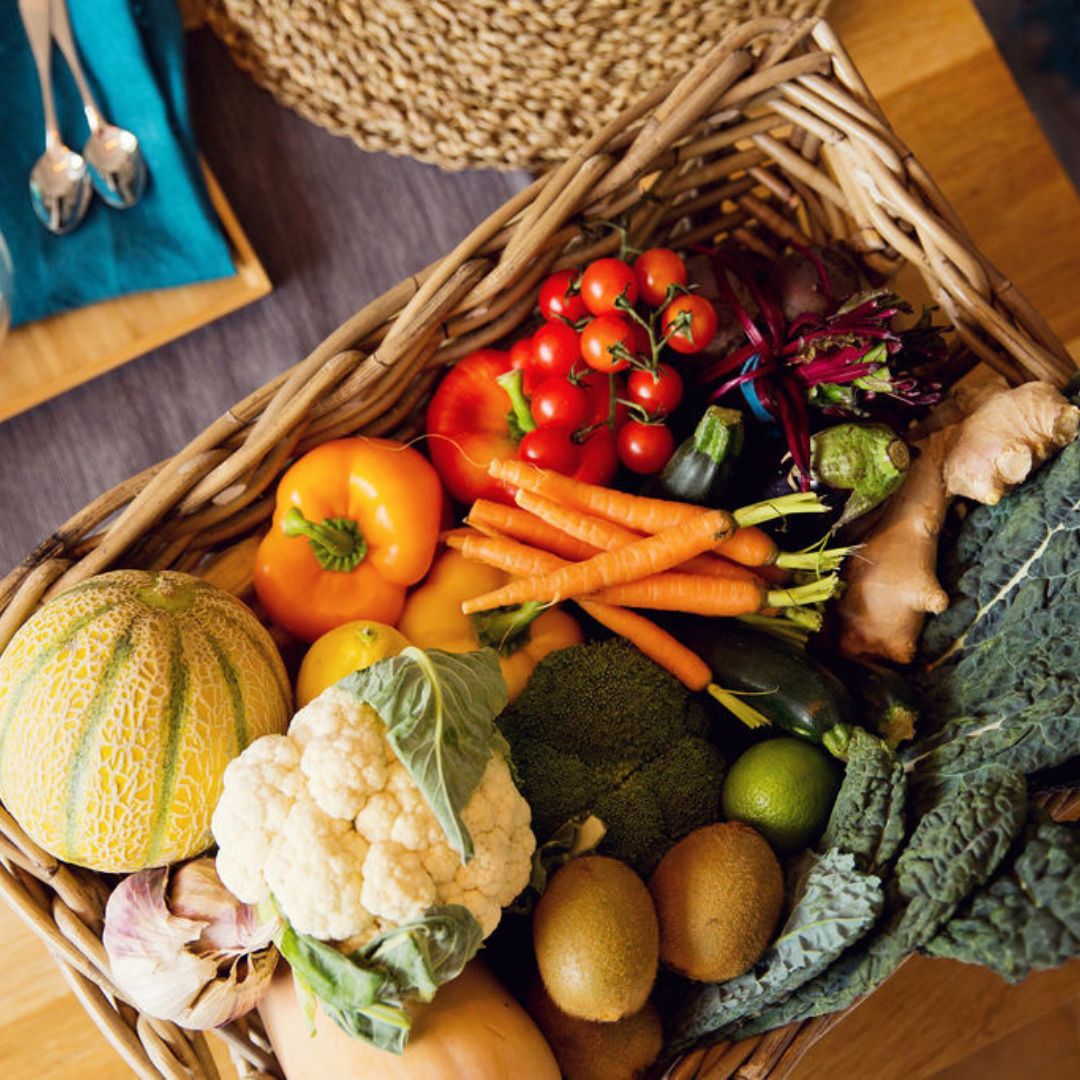
Salmon Summer Salad
Salmon is excellent source of omega 3 fatty acids, which research shows can help to alleviate symptoms of low mood. This is a delicious recipe perfect for Spring.
Serves 2
Ingredients
2 salmon fillets
3 tbsp olive oil
1 x chicory heart - red is nice
10g parsley
juice of 1/2 lemon
1 tbsp capers
1/2 avocado 1
00g cherry tomatoes
20g red onion
50g rocket celery leaves
Method

Good Mood Foods
How we nourish our bodies has a profound effect on our mood. Here are my top foods to include… and what to avoid.
IN
OUT

Food and Mood
The link between physical health and what you eat is well understood, but did you know that what you eat has a huge impact on your mood and how you feel?
I wonder how we forgot about this connection, because it was common knowledge in times gone by. Way back when (think medieval times), people would eat quince, dates and elderflowers if they were feeling a little blue anduse lettuce and chicory as nature’s tranquilisers.
Modern science has extensively studied the impact of food on mood, and we now understand why food has such a positive (or negative) effect, and which foods we should be eating more (or less) of to support mental health.
Managing anxiety, stress, depression, and other mood disorders is complex, and there’s no one-size-fits all solution. But we know that the right diet and lifestyle plan combined with motivational coaching to help you every step of the way can be an enormous help.
The very edited highlight of the research into what you should eat to balance your energy and improve your mood is to follow a Mediterranean-style diet featuring plenty of whole, natural foods.
That also means learning to balance your blood sugar levels. Loss of blood sugar balance has a clear link to stress, anxiety, and depression. 50% of low mood is down to blood sugar imbalances. Learning how to become a master of your blood sugar balance is the secret to having more energy, a better mood and controlling your weight – and losing it if you need to.
Feeling more confident about the way you look is in itself an excellent way to boost feelings of self-worth. In the same way that eating well can positively influence mood, making poor food choices can have the opposite effect. Research by a team at Binghamton, New York, showed that young adults under 30 who ate fast food more than three times a week scored higher when it came to levels of mental distress. The same researchers found that those who ate meat fewer than three times a week had more mental health problems (potentially as the amino acid tryptophan found in meat is the precursor to the feel-good chemical serotonin).
Low mood affects up to 20% of us at any one time, so everyone is likely to experience some form of it at one time or another. Many periods of low mood can be almost eradicated by following some simple steps. Not only because this addresses many of the physical causes of low mood, but also because you are spending your time focusing on a positive action plan and learning new things rather than ruminating about problems.
To find out more about how a nutrition & lifestyle programme can help, why notbook a free call with me. Here’s the link.

Happy Tummy Foods
Some foods are excellent for supporting our digestion and here are some of my favourites that I suggest to clients on a regular basis:
Cruciferous vegetables
These smelly veg bring amazing health benefits on a number of different levels. Since we’re talking about foods that are helpful for your digestion, you should know that they contain compounds called glucosinolates, which are fermented by bacteria and used as fuel. They are prebiotic.
Examples:
Bok choy, broccoli, Brussels sprouts, cabbage, caulifiower, kale , rocket, spring greens, watercress.
Fermented foods
Fermented foods have a long tradition in some parts of the world, especially Asia, Africa and Eastern Europe. Bacteria (and sometimes beneficial yeasts) might be involved in the process and the result is an increase of good bacteria in the foods. You’ve probably heard of live or ‘bio’ yoghurt.
Some of these other probiotic foods might sound peculiar and a little ‘advanced’ for most regular people. However, they are now commonly found on supermarket shelves (you'll find them in the world foods aisle where the Oriental products are) and, while they might not be the kind of product you would usually go for, it is always worth experimenting. Kimchi, in particular, is often combined with chilli and other flavours and is far tastier than its name might suggest.
Examples include yoghurt, pickles (gherkins), sauerkraut, kimchi (fermented cabbage), tempeh (fermented soya beans), natto (fermented soya beans), miso soup (fermented soya beans), tamari soy sauce, buttermilk, some cheeses like cottage cheese, gouda, mozzarella and cheddar.
Fermented drinks
Like other fermented products, these were once only found in health food shops and were perhaps the prevail of people who ate a very clean and unprocessed diet.
These were a secret waiting for the masses to discover. Often flavoured with fruits, they really are delicious and do not taste 'worthy'. You'll find them in the chilled drinks section in most supermarkets.
Kombucha (fermented tea - sweet and fizzy but without sugar) and kefir (fermented dairy drink very much like a yoghurt drink) are examples.
The only way you’ll know if it’s for you is to try!
Fibre
Fibre is one of the best things to eat to support healthy digestion. Fibre is described as being either insoluble or soluble.
This is part of the plant wall in fruit and veg. It’s indigestible so it passes right through your system, sweeping up toxins and other waste products as it goes, and keeping you regular. The undigested fibre is also fermented by gut bacteria, producing the beneficial short chain fatty acids mentioned earlier.
YOU CAN FIND INSOLUBLE FIBRE IN:
Fruit and veg, beans and lentils, oats and wholegrain foods like brown rice and wheat.
This can be partially digested and is well-celebrated for its ability to reduce cholesterol in the blood and normalise blood sugar levels.
YOU CAN FIND SOLUBLE FIBRE IN:
Oats, veg, fruit (especially apples, pears, berries, and citrus fruits), beans and lentils.
Anti-Microbial Foods
Some foods exert a natural antibiotic or anti-fungal effect and can be useful for keeping nasties like pathogenic bacteria or unwelcome yeasts at bay.
These include caprylic acid found in coconut. Coconut oil is also a very good oil to use in cooking, especially at high temperatures.
Garlic contains the active ingredient allicin, which has historically proven itself to be an effective killer of both bacteria and viruses, making it a great immune-boosting ingredient. Use it raw wherever possible.
Olive oil – the oleic acid has anti-bacterial properties. Use it generously to dress salads and veg.
And we can’t have a list of the foods to add in, without looking at what we need to avoid for a happy tummy:
Sugar and refined carbohydrates
In same way there are things your digestive system loves, there are things it will not love you for. Sugar. That’s the number one thing to avoid, plus anything that contains added sugar.
Other things your tummy is not fond of include highly refined products like white rice, pasta, pastry and snacks like crisps and biscuits.
If you would like to take a look at your gut health – whether you have symptoms or would just like to be optimally well – why not book in a free call? You can book via the link here.

Kimchi
This is a traditional Korean fermented dish. During the fermentation process, the naturally-occur- ring bacteria produce lactic acid, which is a natural preservative. Thanks to its probiotic qualities, it’s a favourite among nutrition professionals and excellent for gut health!
Ingredients
Medium Chinese cabbage, cut into bite-sized pieces
1 tsp sea salt
1 fresh chilli, seeded and finely sliced
4 spring onions, finely sliced
4 cm fresh ginger, grated
2 cloves garlic, crushed or finely chopped
Freshly ground black pepper
1 tsp sugar
Method

Fix Your Digestion Naturally
There are few things worse than tummy troubles. If your digestive system doesn’t work as it should, the result might be pain or discomfort right through to downright embarrassment at the gurgly noises and bad smells your body produces. It doesn’t have to be that way and, as a nutrition practitioner, I am always amazed by how long some of my clients have been trying to muddle through before they seek my help.
What scientists now call the ‘microbiome’ is a parallel universe of all kinds of different microorganisms running all through your digestive tract, that runs from your mouth to… well, the other end.
Most of these organisms are bacteria, and there are lots more of these than there are cells in your body - about ten times as many. The balance of the bacteria in your digestive system has implications for your health in general and not just your innards. In short, it’s important to have the right kinds of bacteria in the right places. It matters that the ratio of good to bad bacteria works – when you’re out of balance (there are more unfavourable bacteria and other microorganisms) nutritionists call this ‘dysbiosis’.
Dysbiosis can result in your digestive system becoming a more favourable environment for yeasts like candida or parasites. There are some places you don’t really want many bacteria, whether good or bad, like in the small intestine. Your body really should do a daily swoosh of all bacteria from the small intestine down to the colon (it's called the Migrating Motor Complex).
There are many reasons why this might happen – like having had food poisoning in the past – and the result is that the bacteria left behind feast on the food you’re eating, causing bloating, wind, feelings of nausea, diarrhoea and constipation (or a combination of the two). Essentially, all those things you might be linking to your irritable bowel syndrome (IBS).
I’m going to be straight with you and say that the ideal situation is that you bring your digestive problems to me, and that we talk about getting to the bottom (excuse the pun) of exactly why your system isn’t working the way it should, and this usually involves some testing. When you’re ready to prioritise your health, you know where I am.
In the meantime, here are my top 5 tips to help to fix your digestion
The first step in the digestive process is often overlooked but it's a really important one. Known as the cephalic phase, it’s triggered when you see or smell food. You are literally whetting your appetite. When you start thinking about the lovely meal you are going to prepare, you are getting your digestive juices flowing. The enzymes in your saliva help you break down your food more easily so, when the time comes, your body is actually ready to start digesting food before you have even cut the first slice – never mind actually putting anything in your mouth.
It may sound an incredibly simple step – and it is – but these days we are often so busy that we don’t make the time to think about our food in this way. If you find you're always eating on the go, throwing a sandwich down your neck at your desk or having a TV dinner, this is a vital step you are missing out on. One trick is to be mindful and try and spend a few minutes thinking about your tasty lunch before you eat it to get the digestive juices going.
Your stomach does not have teeth! Chewing your food is the second phase of digestion, and it’s key when it comes to good gut health. With proper chewing, you are mechanically breaking down the food into smaller pieces, so that there’s a greater surface area and the digestive enzymes can get to work more easily, doing their job. And the bad news?
If you’re not chewing properly, it’s highly likely that you’re not digesting your food properly. And that means you won’t be absorbing vital nutrients either. Not chewing also means the food you eat takes much longer to break down and, as it hangs around in your digestive system, it can start to ferment, causing uncomfortable wind, gas and bloating. Don’t worry about chewing a certain number of times – that all depends on what you are eating and various other factors.
Instead try this test: chew your food enough so that if someone asked you to spit it out, they wouldn’t know what you had been eating. Another sign you need to chew more is if you start to see undigested food in your stools.
Sales for heartburn tablets are skyrocketing because so many people wrongly assume that their digestive troubles are because of too much stomach acid. What nutritionists like me find more frequently in the clinic is the total opposite! Getting older, stress and some over-the-counter medications can make your stomach acid levels drop to the extent that you don’t produce enough to digest food sufficiently.
Why is this important? The stomach acid you produce not only kills any bacteria in the food you are eating, but it also breaks down the protein in your meal. If you’re not properly digesting the protein element in food, it can start to ferment, creating gases that force up the oesophagal sphincter muscle (a type of muscle flap) and what little stomach acid there is can escape. So that burning feeling, especially if accompanied by smelly gas, can be a sign your digestion isn’t working as well as it should be.
One solution is to have a teaspoon of apple cider vinegar before each main meal. It’s important you choose apple cider vinegar with the ‘mother’ rather than one you can buy in the supermarket (that’s for your chips).
There are people who genuinely produce too much stomach acid and, if you try the apple cider vinegar trick and it seems to make things worse, you can neutralise the acid by taking a little bicarbonate of soda.
Digestive enzymes break down your food into nutrients so your body can absorb them. But as you age, you naturally produce fewer of these helpful enzymes. You can counteract this by increasing your intake of foods that are higher in them – eating pineapple or papaya before a meal can help.
If you aren’t a fan of these fruits, instead try a digestive enzyme capsule (available from health food shops), which will give your system a gentle boost to help it do its job properly.
Not eating is almost as important for your health as eating. It’s important to space out your meals so the digestive system actually gets a chance to rest. This might require some self-discipline if you’re a frequent grazer.
Eating every 4-6 hours is a good benchmark to aim for and gives the body enough time to completely digest the previous meal and have a break before you put it to work again.
Of course, there will be days when your eating routine falls out of whack, but don’t beat yourself up. Just try and get back on track the following day.
And if you would like some help working out *why* you have these symptoms, why not get in touch? You can book a free call here.
![]()
Please get in touch and find out more - I offer a free 30-minute exploratory call.